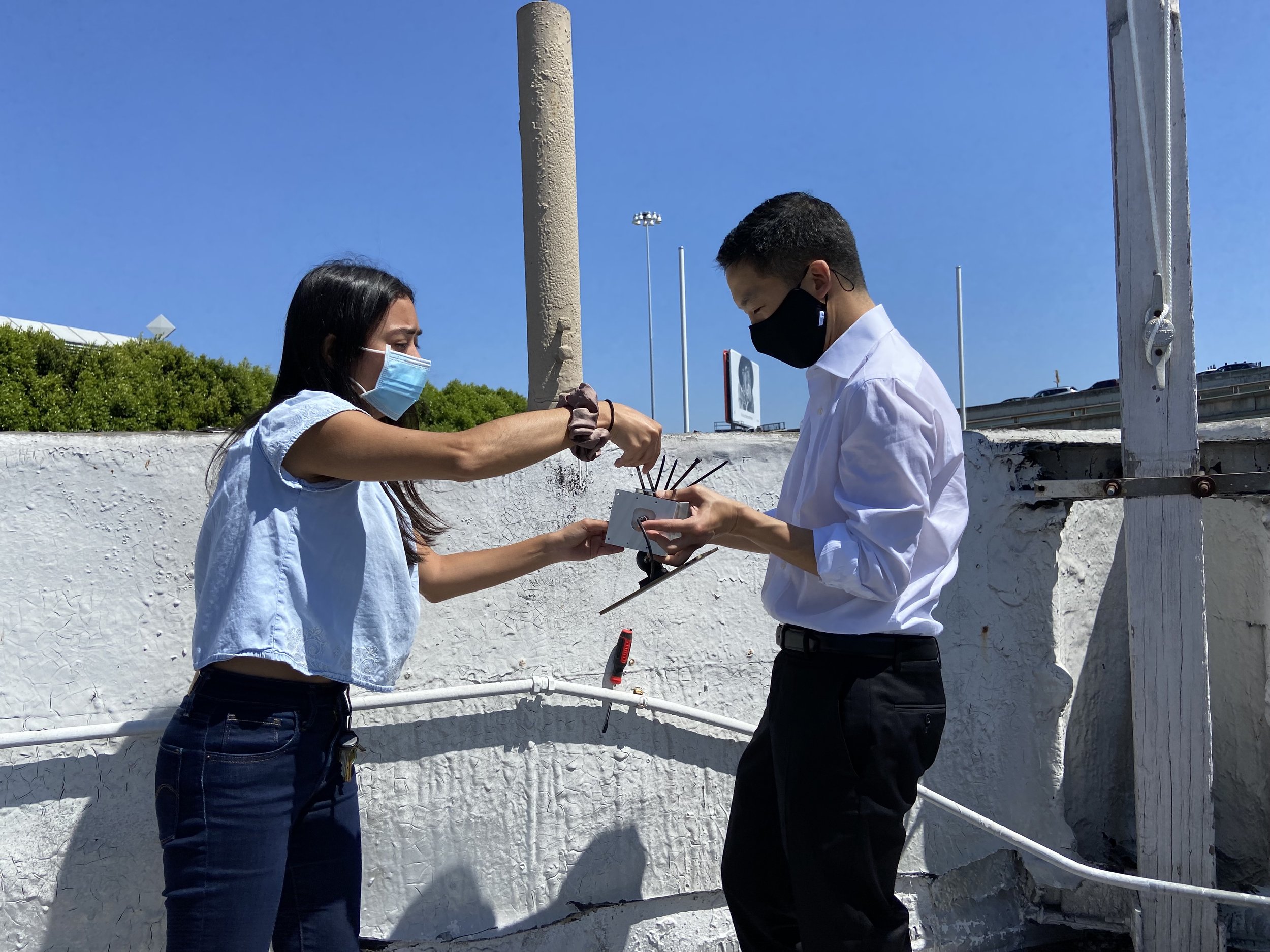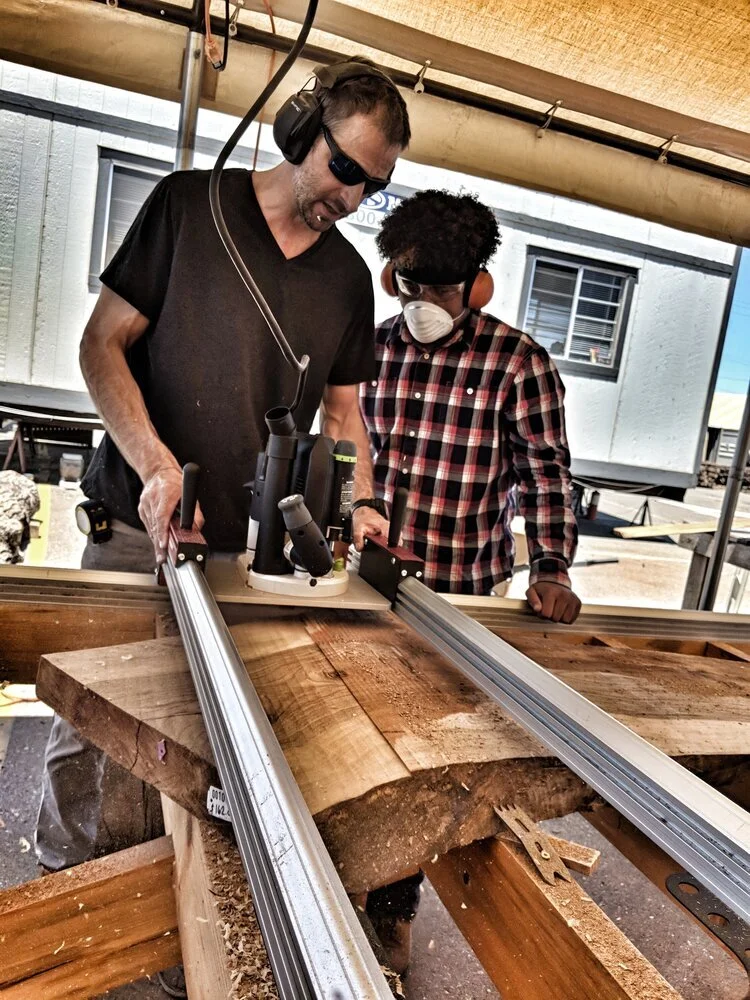Supported by $2.4 million from a $23 million Transformative Climate Communities implementation grant, a coalition of community members, non-profits, and public-sector agencies called Green Together, is working to build a new generation of air quality ambassadors in the Pacoima and Sun Valley communities of the San Fernando Valley. The Clean Air Ambassadors Program, established as part of the Green Together Community Engagement Plan, trains community youth organizers through workshops covering air quality monitoring, health, climate change and air pollution. Through the program, ambassadors learn how to collect and interpret data using scientific tools to measure local particulate matter pollution. Ambassadors also learn how to communicate air pollution principles and advocate for data-informed clean air solutions. In 2021, the Clean Air Ambassadors Program hosted its inaugural class of youth leaders.
Supporting Energy Efficiency and Clean Energy Generation in Multi-Family Farmworker Housing
People’s Self-Help Housing was awarded over $630,000 from the Low-Income Weatherization Program’s Multi‑Family Energy Efficiency and Renewables program to invest in the health and well-being of its low-income farmworker community in Santa Maria, known as Los Adobes de Maria. The homes of the 65 farmworker families living in Los Adobes de Maria will receive energy efficiency upgrades that will reduce energy consumption and lower their bills.
Collecting Air Quality Data to Improve Community Health in Eastern San Francisco
Brightline Defense, an environmental justice nonprofit organization, was awarded $300,000 from the Community Air Grants program to support the Brightline Air Quality Monitoring Program. This community-driven program that will install, collect, and analyze data from 15 stationary air quality sensors in heavily populated, low-income communities throughout Eastern San Francisco. The data these sensors collect are publicly available and can be used to help shape programs and policies to create cleaner air in these communities.
Launching a New Capacity Building and Community Empowerment Project
The Partners Advancing Climate Equity (PACE) pilot program is a capacity-building program administered by the California Strategic Growth Council and funded by the Greenhouse Gas Reduction Fund. The year-long pilot program began in 2021 and supported 22 participants – all local leaders deeply rooted in their communities across the state – and sought to increase their ability to advance equitable and community-driven climate solutions.
Climate Resilience Planning for Key Sacramento River Watersheds
Supported by $400,000 from the Climate Adaptation and Resiliency Program, a coalition of federal, academic, non-profit and private organizations has developed a modeling tool to enhance climate adaptation and resilience planning in five Sacramento River watersheds. These watersheds provide the vast majority of California’s utilized water and over 80 percent of the freshwater to San Francisco Bay. By estimating the ecological returns of conservation and restoration efforts, the modeling tool will help determine what future actions and investments would best restore and protect the health of this important region.
Supporting Families with Affordable Housing
Supported in part by nearly $23 million award from the Affordable Housing and Sustainable Communities Program, Resources for Community Development (RCD) will provide 87 affordable rental homes in the city of Berkeley through the Maudelle Miller Shirek Community project. In addition to large, family-sized apartments and permanent supportive housing for formerly homeless residents, the ground floor of the building will become the headquarters of Healthy Black Families, Inc., a South Berkeley-based nonprofit dedicated to the health of Black families in the community. This project will help Black families and formerly homeless individuals live healthier lives and receive health services through on-site programs and services offered by Healthy Black Families, Inc.,, RCD’s resident services, and the City of Berkeley Mental Health department and third-party service providers.
New Community Composting Program Sequesters Carbon While Providing Local-Level Benefits
The California Alliance for Community Composting (Alliance)is helping community groups develop or expand 50 community composting sites in disadvantaged and low-income communities across California using funds from the Community Composting for Green Spaces Grant Program. Altogether, these sites are expected to prevent nearly 11,000 tons of organic waste from going to landfills by creating compost, which prevents the release of greenhouse gases during its decomposition. The Alliance’s work will also provide communities with additional benefits, including free compost, job training, and more.
Long Beach Urban Wood Recovery Apprenticeship Program Prepares Youth for the Future Workforce
Funded in part by a nearly $1,000,000 grant from California Department of Forestry and Fire Protection’s Urban and Community Forestry Program, the Conservation Corps of Long Beach (CCLB) is implementing an urban wood recovery apprenticeship program that has the potential to be a model for other programs across California. This program is teaching Corpsmembers how to remove hazardous trees throughout the city, control insects and diseases, and divert woody biomass from landfills to help keep greenhouse gases sequestered in the wood. Additionally, trees will be replaced to mitigate poor air quality, a lack of urban green space, and improve storm water retention in disadvantaged communities. Ultimately, this program will provide a foundation for Corpsmembers interested pursuing jobs in urban forestry.
Mountain Meadow Restoration Sequesters Carbon and Builds Resilience
Supporting Ecosystem, Community, and Cultural Resilience at Clover Valley Ranch
With help from a $680,974 grant from California Climate Investments through the Wetlands & Watershed Restoration Program, the Sierra Fund and project partners are carrying out multi‑benefit restoration efforts at the 2,655‑acre Clover Valley Ranch. Initiated in 2017, this project will sequester nearly 188,000 metric tons of carbon dioxide equivalent while halting stream incision; increasing biodiversity; and improving hydrologic function, flood reduction, sediment filtration and water quality. However, the goal of this project extends beyond of ecosystem function and carbon sequestration benefits; these activities will also support community and cultural resilience through the promotion of cultural skills and activities.
Water Energy Grants Provide Direct Benefits to Low-Income Households in Rural Counties
The Association of California Community and Energy Services partner agencies replaced 1,090 washing machines and 855 dishwashers with water- and energy-efficient machines . These energy and water savings will continuously provide cost savings across various communities in Kern, Madera, Contra Costa, Kings, San Francisco, and Merced counties and other low-income homes in San Mateo, Shasta, and Tehama counties.
Madera County Connects Residents with Water Efficiency Devices
“For the community; by the community” is the motto of the South-East Madera County United (SEMCU), a non-profit mutual benefit organization in the heart of the San Joaquin Valley. In May 2015, with a $218,594 grant from the DWR, members set out to provide water efficiency devices for approximately 75 percent of homes and businesses within SEMCU’s boundary, an area encompassing five disadvantaged community census tracts.
Wishing Tree Park Provides New Green Space in West Carson
One of the Los Angeles Neighborhood Land Trust’s most exciting parks currently under construction is the 8.5‑acre, multi‑benefit Wishing Tree Park located in unincorporated West Carson, Los Angeles County. This project has been in the works for decades, and thanks in part to a $2,500,000 grant from California Climate Investments through the Urban Greening Program the park will be opening to the public in late 2021.
Greening the Yellow Brick Road Project Transforms Street into a Symbol of Activity and Hope
With $4.1 million from California Natural Resources Agency’s Urban Greening program, this project is helping bring the community’s vision to fruition and will benefit thousands of community residents. The project will create a safe and green public space where neighbors can come together and a designated route for residents to bike and walk in a safe environment.
Reclaimed Urban Wood Supports Small Businesses and Reduces Landfill Emissions
A $996,600 grant from California Climate Investments through the Urban and Community Forestry program will help Urban Salvaged and Reclaimed Woods, Inc. pilot a shared storefront project. This storefront will allow businesses handling salvaged wood from urban areas to combine resources to better process, market, and sell their products.
Urban Wood Rescue Project Trains Youth and Sequesters Carbon
Reviving Stockton's Urban Tree Canopy
Bringing Electrification and Energy Efficiency to Low-income San Francisco Communities
The Tenderloin Neighborhood Development Corporation’s (TNDC) commitment to help San Francisco’s low‑income communities thrive by building affordable housing was energized by an electrification project at its SOMA Studio and Family Apartments (SOMA Apartments) in 2020. The effort is supported by a $633,000 award from California Climate Investments through the Department of Community Services and Development’s Low Income Weatherization Program’s (LIWP) Multi‑Family component. With that money and contributions from other local energy efficiency programs, TNDC kept utility bills low for residents while electrifying major central building systems and reducing greenhouse gas emissions. Built in 2003, the SOMA Apartments include 162 homes with more than 60 percent of its households classified as extremely low‑income (earning less than 30 percent of the area median income).
Training and Partnerships Bring Community Solar to Low-income Households
Thanks to $2 million from California Climate Investments through the Low‑Income Weatherization Program, GRID Alternatives Inland Empire is implementing the Community Solar Pilot project, the first community solar array in California specifically designed to benefit low‑income households. Situated on Santa Rosa Band of Cahuilla Indian tribal lands in Riverside County, the Community Solar Pilot project will not only lower energy costs for tribal members and other low‑income households but also provided an opportunity for tribal members to gain valuable experience as solar installation trainees.
No-cost Energy Upgrades Serve Low-income Farmworker Households
Mrs. Rojas and her family now have a solar photovoltaic system and energy efficiency upgrades in their home, including a high efficient air conditioning system, new windows that minimize heat transfer, a smart thermostat, and other measures that reduce energy costs while improving the comfort and livability of their home and its resiliency to climate change.






















